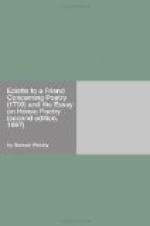After the Invocation, in the very beginning of the Poem, he’s preparing the Incidents for his Hero’s Death; he brings him to Jerusalem at the Passover with Hosanna’s; then raises his Machines, and falls to the Description of Hell. He through the whole, uses his Figures very gracefully; few have been more happy in Comparisons, more moving in Passion, succinct, yet full in Narration: Yet is he not without Faults; or in the second Book he brings him to his last Supper in the Garden, from thence before Caiaphas and Pilate; which too much precipitates the main Action: Besides, it seems harsh and improbable to bring in S. John, and Joseph, our Saviour’s reputed Father, as he does in the Third and Fourth Book, giving Pilate an account of his Life; not to insist on the general Opinion, that Joseph was not then alive. But notwithstanding these few failures, it can’t be deny’d, that his Description of our Saviour’s Passion in the Fourth Book, is incomparably fine; the disturbance among the Angels on that occasion; his Character of Michael, and the Virgins Lamentation under the Cross, and at the Sepulchre, are inimitable. And thus much for Vida, on whom I’ve been more large because I’ve often made use of his Thoughts in this following Work; his Poem being the most complete on that Subject I’ve ever seen or expect to see. And here han’t the English more reason to complain of Rapin, that he takes no notice of their Heroic Poems, than Lupez Viga of Tasso, for not mentioning the Spaniards at the Siege of Jerusalem: but since he has been so partial, as not to take any notice of our Writers, who sure as much deserve it as their Dubartas and Ronsard; we may have liberty to speak of our own, and to do ’em Justice: To begin with Spencer, who I think comes the nearest Ariosto of any other; he’s almost as Irregular, but much more Natural and Lovely: But he’s not only Irregular but Imperfect too, I mean, as to what he intended; and therefore we can’t well imagine what it wou’d have been, had he liv’d to complete it. If Fable be the Essence of Epic, his Fairy Queen had certainly enough of that to give it that Name. He seems, by the account he gives of it to Sir Walter Rawleigh, to have design’d one Principal Hero King Arthur, and one main important Action bringing him to his Throne; but neither of these appear sufficiently distinct, or well defin’d, being both lost in the vast Seas of Matter which compose those Books which are finish’d. This however must be granted, the Design was Noble, and required such a comprehensive Genius as his, but to draw the first Sketch of it: And as the Design, so the Thoughts are also very great, the Expressions flowing natural and easie, with such a prodigious Poetical Copia as never any other must expect to enjoy. Gondibert methinks wants Life; the Style is rather stiff than Heroic, and has more of Statius than Virgil; one may see every where a great deal of Art, and Pains, and Regularity, even to a fault; nor is a Genius wanting,




